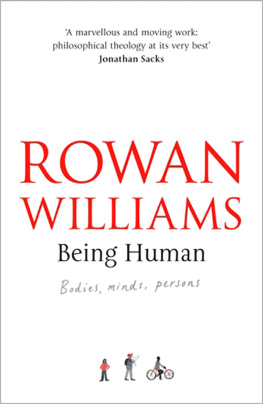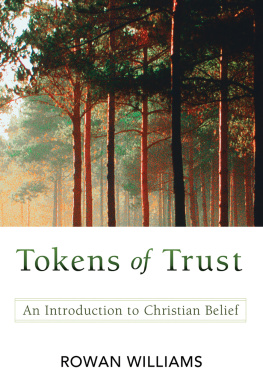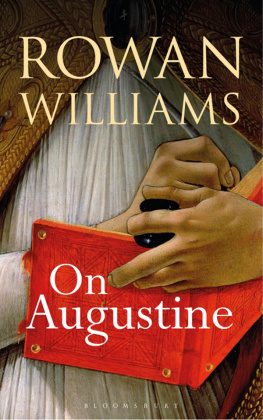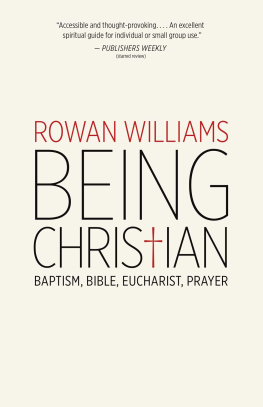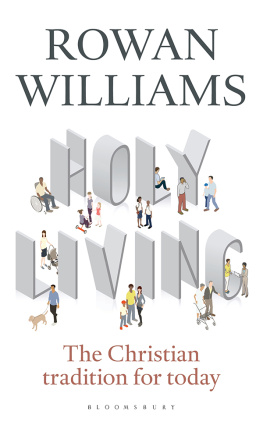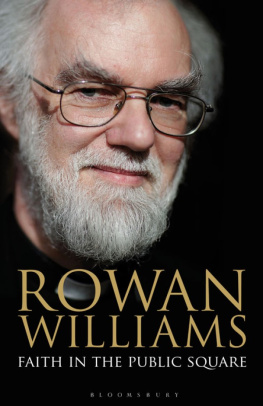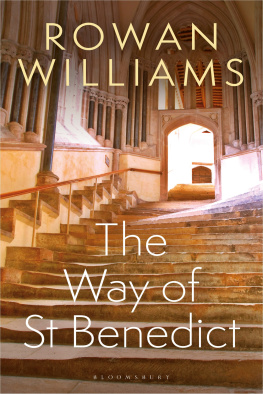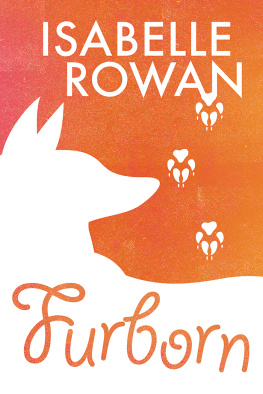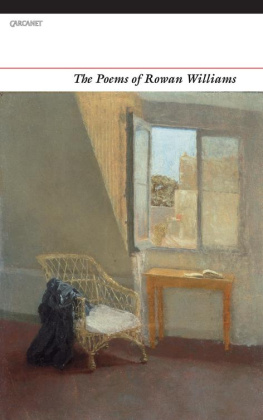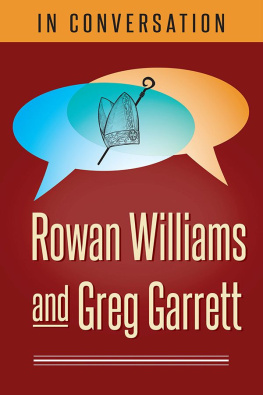Rowan Williams - Being Human
Here you can read online Rowan Williams - Being Human full text of the book (entire story) in english for free. Download pdf and epub, get meaning, cover and reviews about this ebook. year: 0, genre: Religion. Description of the work, (preface) as well as reviews are available. Best literature library LitArk.com created for fans of good reading and offers a wide selection of genres:
Romance novel
Science fiction
Adventure
Detective
Science
History
Home and family
Prose
Art
Politics
Computer
Non-fiction
Religion
Business
Children
Humor
Choose a favorite category and find really read worthwhile books. Enjoy immersion in the world of imagination, feel the emotions of the characters or learn something new for yourself, make an fascinating discovery.
- Book:Being Human
- Author:
- Genre:
- Year:0
- Rating:3 / 5
- Favourites:Add to favourites
- Your mark:
- 60
- 1
- 2
- 3
- 4
- 5
Being Human: summary, description and annotation
We offer to read an annotation, description, summary or preface (depends on what the author of the book "Being Human" wrote himself). If you haven't found the necessary information about the book — write in the comments, we will try to find it.
Being Human — read online for free the complete book (whole text) full work
Below is the text of the book, divided by pages. System saving the place of the last page read, allows you to conveniently read the book "Being Human" online for free, without having to search again every time where you left off. Put a bookmark, and you can go to the page where you finished reading at any time.
Font size:
Interval:
Bookmark:

Born in 1950, Rowan Williams was educated in Swansea (Wales) and Cambridge. He studied for his theology doctorate in Oxford, after which he taught theology in a seminary near Leeds. From 1977 until 1986, he was engaged in academic and parish work in Cambridge, before returning to Oxford as Lady Margaret Professor of Divinity. In 1990 he became a Fellow of the British Academy.
In 1992 Professor Williams became Bishop of Monmouth, and in 1999 he was elected as Archbishop of Wales. He became Archbishop of Canterbury in late 2002 with ten years experience as a diocesan bishop and three as a primate in the Anglican Communion. As archbishop, his main responsibilities were pastoral whether leading his own diocese of Canterbury and the Church of England, or guiding the Anglican Communion worldwide. At the end of 2012, after ten years as archbishop, he stepped down and moved to a new role as Master of Magdalene College, Cambridge.
Professor Williams is acknowledged internationally as an outstanding theological writer and teacher as well as an accomplished poet and translator. His interests include music, fiction and languages.

First published in Great Britain in 2018
Society for Promoting Christian Knowledge
36 Causton Street
London SW1P 4ST
www.spck.org.uk
Copyright Rowan Williams 2018
All rights reserved. No part of this book may be reproduced or transmitted in any form or by any means, electronic or mechanical, including photocopying, recording, or by any information storage and retrieval system, without permission in writing from the publisher.
SPCK does not necessarily endorse the individual views contained in its publications.
The Scripture quotation is taken from the New Revised Standard Version of the Bible, Anglicized Edition, copyright 1989, 1995 by the Division of Christian Education of the National Council of the Churches of Christ in the USA. Used by permission. All rights reserved.
British Library Cataloguing-in-Publication Data
A catalogue record for this book is available from the British Library
ISBN 9780281079759
eBook ISBN 9780281079766
Typeset by Geethik, India
First printed in Great Britain by Jellyfish Print Solutions
Subsequently digitally reprinted in Great Britain
eBook by Geethik, India
Produced on paper from sustainable forests
This book completes a sort of unintended trilogy, following earlier books, Being Christian and Being Disciples. It is less about the basics of Christian belief and behaviour and more about the sort of questions in our culture that make us wonder what real humanity is like and whether our most central ideas about what is human are under threat in this environment. As these chapters suggest, there are grounds for being a bit concerned about our current models of human life and human well-being. No need to panic; but if we are to think and act in a way that helps to make the world more rather than less human and humane we do need more clarity than our culture usually gives us as to what we think is more human. So the chapters of this book examine some sources of contemporary confusion, and outline some of the characteristics that we might look for in human lives when they are in touch with or in alignment with the grace and joy of what is ultimately true with God and with the will of God, as Christians would say.
These pieces are a bit more demanding in some ways than most of the shorter talks collected in the earlier books, so it may help to give a quick sketch of each chapter to draw out the main arguments.
looks at the question of what we understand by being conscious and self-conscious. A lot of popular scientific literature these days encourages us to think of the mind as a machine or the brain as a computer or whatever. But its impossible to think consistently about being conscious without reference to our locality in a material world, without a sense of narrative, the story of a self, and without factoring in our relationships and our language.
So what is a person in the light of all this? tries to suggest some answers. A person is not simply another object, and not something whose presence or absence we can decide just by applying a set of objective criteria. Persons are more than individuals; they are both spiritual and material, and their uniqueness is fulfilled in community not in isolation and total independence.
And if we ask what it means to say that a person is both spiritual and material, we are in the territory covered by , which looks at bodymind relations in the light of some of the recent scientific discussions of left-brain and right-brain functions and the complex role of the body in what we call thinking. We think with our bodies because we have to learn how to find our way in a world of bodies. And this should make us wary of any picture of our humanity that isolates it or imagines our human knowing as being like beams from a lighthouse playing over a world of passive stuff rather than being a process of rich interweaving of stimulus and imagining, worked out in and through bodies.
We are very much in love these days with the ideal of autonomy, self-direction, the independent control of our environment. looks at the ways in which religious faith helps us understand how we can be dependent without humiliation, as it also helps us deal with the educating of our instincts and passions, with the passing of time and the acceptance of our mortality. Part of the good news that faith offers is the realization that learning to depend on God and to live with (not in opposition to) our limits in time and the body is something that increases our freedom rather than reducing it.
And this means that in our life and our prayer we do not have to be afraid of letting go of the need to be in charge, to be explaining and organizing all the time. As suggests, human beings who have grown into their full freedom will be at home with silence and openness before God. Which is also why good worship is worship that takes us beyond the urge to explain and manage, and leads us to take the time we need to open up to the endless richness of divine life that has been offered to us through the life and death and resurrection of Jesus.
In fact, we are brought back to the basics of belief again to the conviction that to understand properly what our humanity really is we need to look to Jesus. The book ends with a sermon about the Ascension of Jesus as a sign that all the diverse aspects of human experience, including its darkest moments, are capable of being taken up and transfigured in the action of Jesus Christ.
Unless we have a coherent model of what sort of humanity we want to nurture in our society, we shall continue to be at sea over how we teach, how we vote, how we save and buy and sell, how we entertain ourselves, how we think about the beginning and the end of life. This little book will not provide once-and-for-all answers to the various questions this involves, but I hope it may help clarify what sort of priorities a Christian might want to have in mind in engaging with them; just a little bit of a manual of resistance to the forces political, economic, psychological that pressure us to be less than God wants us to be.
Once again, my thanks go to Philip Law and all at SPCK for their encouragement to pull together this group of talks and reflections, and their dedicated help in producing a publishable text.
Font size:
Interval:
Bookmark:
Similar books «Being Human»
Look at similar books to Being Human. We have selected literature similar in name and meaning in the hope of providing readers with more options to find new, interesting, not yet read works.
Discussion, reviews of the book Being Human and just readers' own opinions. Leave your comments, write what you think about the work, its meaning or the main characters. Specify what exactly you liked and what you didn't like, and why you think so.

